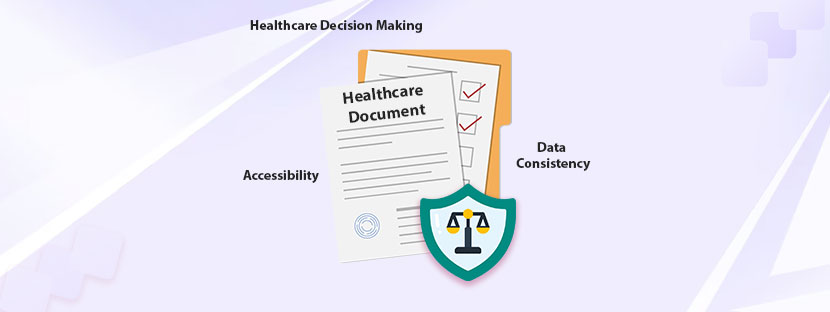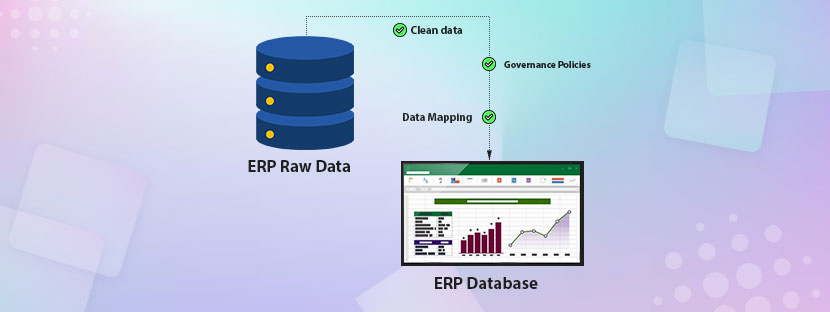Do you want to improve your data quality to provide better patient care?
If yes, then all you need is to focus on your data governance policies first. It’s a fact that organizations with mature data governance programs have reported an improvement of 65% in their data quality metrics. It also means the error rate has reduced by one-third of its previous level.
For a healthcare organization, it’s important to manage its data to ensure the ultimate quality. Following up on data governance, let it happen.
Let’s see in this blog how healthcare organizations practice data governance to improve their data quality.
Get it now!
Why is data governance in healthcare important?
Data governance is a practice that safeguards data quality by maintaining its accuracy, reliability, and completeness. It’s more like adding an extra layer of protection against the potential errors that your data may face in the future. Besides that, following data governance policies strictly also standardizes data practices, which reduces problems in the data analysis process.
Data governance takes care of the patient records and the complete lifecycle management of health records. From collecting the patient records to analyzing and storing, the principles of data governance manage everything. It ensures better coordination between patients, healthcare providers, insurers, and other professionals who are associated with the medical field.
Barriers to data quality in healthcare
Data governance issues in healthcare have come into the world openly during the covid times. The pandemic has exposed long-standing data governance issues that the healthcare industry has faced for the last many years. It’s all related to intellectual property rights, data sharing mechanisms, data storage issues, interoperability, and many other things.
If we look at these errors closely, we can find a pattern among these issues. By that trail, we can sum up the challenges into the following things;
a) Data Inconsistency and Inaccuracy
The healthcare system is basically an amalgamation of various systems. It’s subdivided into various departments with different fragmented systems. Without the existence of a proper data governance strategy, data can become fragmented, which will lead to inconsistency and inaccurate later on.
Let’s understand this with an example.
Suppose a hospital has recorded patient data in multiple systems, some datasets in EMR, some in the data lab, while some in the billing system. The actual problem occurs when it comes to getting a unified view of the data. Incomplete data is stored in every segment, and that appears multiple times when the data is unified. As a result, it has increased the administrative burden to fix all the records. It now needed proper manual data entry to organize the entire dataset.
b) Risks of regulatory compliance
Various data protection mechanisms are in place that you have to follow mandatorily in order to work with healthcare data. For example, the HIPAA (the Health Insurance Portability and Accountability Act) is in the United States, which mandates the privacy of healthcare data. It applies everywhere, whether it is handling the data, including the developers who are developing healthcare applications in the US.
In Europe, there is the General Data Protection Regulation (GDPR) in place that governs the personal data of EU citizens. This is a broad data protection law that covers healthcare professionals as well as the developers who build healthcare applications.
Any breach of these laws leads to hefty fines. Eventually, many healthcare organizations have faced fines earlier for not maintaining their data by the law.
c) Poor data shareability and interoperability
Data should flow seamlessly through the healthcare channels for better healthcare outcomes. However, it’s a challenge that it cannot do so because of interoperability issues. Primarily, healthcare data comes in different formats and forms from numerous sources. From EHRs, surveys, clinical research, etc., for example. When data is stuck in the system, it creates issues and degrades quality outcomes. Hence, data runs in silos.
Unfortunately, this happens when the healthcare system runs without any strict data governance guidelines at all. In order to ensure the complete functioning of healthcare records throughout the healthcare system, you need to establish data governance protocols.
How does data governance mitigate these barriers?

Following up on strong data governance protocols can mitigate data barriers in healthcare. It can also provide the data benefits that the healthcare system deserves — all at once. Let’s check how it can be solved.
Better healthcare decision making
Trustworthy data is everything, especially in healthcare. The robustness of the government plan to deliver quality healthcare services depends on the quality of the data management system. From disease tracking to medicine disposal, the relevance of accurate data is everywhere for healthcare programs to roll out.
Optimize costs
The cost of poor data is huge, and it’s become life-threatening when it comes to healthcare. Human lives will be directly affected if the data governance strategy fails. On the other hand, the data governance failure management strategy is cost-effective. It won’t cost much. Hospitals can make their data management procedures centralized in order to reduce costs and associated elements.
Assured compliance
Data government metrics build on the pillars of data compliance and data security. It means when you follow it, you can make data compliance on time. Regulations such as HIPAA, GDPR, etc, will be managed with a proper mechanism and compliance. Overall, it can protect your organization from external threats and save your reputation.
Bring a competitive advantage
To stay relevant with modern healthcare practices, data governance practices help your healthcare system stay competitive. With the right governance protocols, you can bring new developments to your healthcare system, like AI implementation. It can leverage your practices to the next level and improve your patient outcomes.
How to bring data governance in healthcare
Following up on a dynamic data governance protocol can help you bring the best data governance measures to your healthcare system. Or you can take a professional data management company’s help in order to bring it. Ultizing data in the right direction can provided you with the right results that you deserve.











